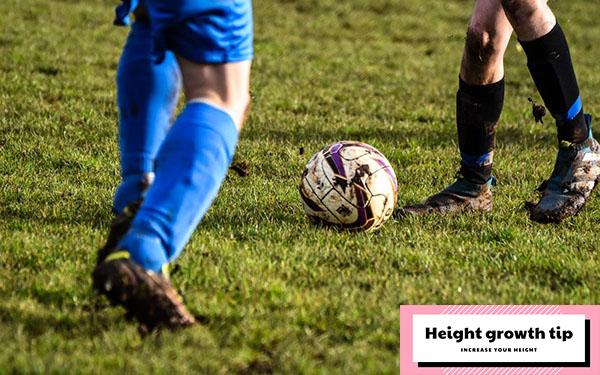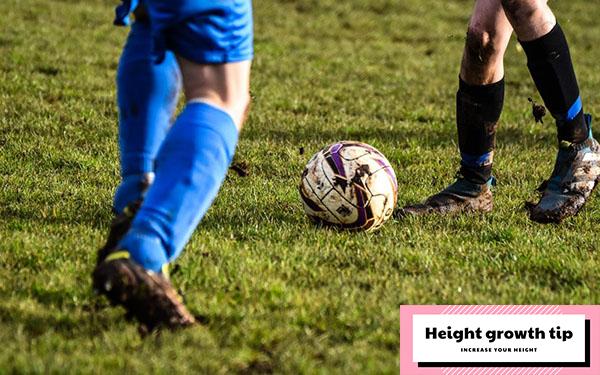
What is the ideal age to commence soccer for promoting growth in height?
The ideal age to begin playing soccer with the potential for promoting height growth is typically between 6 and 9 years old. During this phase of development, children usually have improved visual acuity, better coordination, and longer attention spans. Additionally, their bones and joints are more mature, facilitating smoother and more effortless movements.
Engaging in soccer during this age range can contribute to increased flexibility, improved muscle tone, and support the potential for height growth in children.
But what if someone wishes to start playing soccer at a later stage?
While soccer can still be a beneficial activity for height enhancement for individuals of nearly any age, it holds particular promise for those under the age of 20. As mentioned earlier, running and executing agile maneuvers are effective methods for stimulating height growth. Quick lateral movements can help stretch leg muscles, while extended periods of running can promote lower body muscle development.
While older individuals may not experience significant height growth through soccer, they can still enjoy various health benefits. Continue reading to discover more.
The Multifaceted Health Advantages of Engaging in Soccer
Participating in soccer offers a wide array of health benefits that span across multiple dimensions of physical and mental well-being, creating a comprehensive and enriching experience:
- Enhancing Cardiovascular Health: Soccer involves covering distances of up to 7 miles in a little over 90 minutes, resulting in a significant increase in heart rate and improved blood circulation to muscles. This not only enhances endurance but also reduces the risk of chronic heart diseases by preventing the buildup of arterial plaque.
- Boosting Aerobic Capacity: Soccer is an aerobic sport that requires players to maintain a continuous cycle of running, walking, and sprinting for approximately 45 minutes before a brief rest period. This consistent activity fosters an improved aerobic capacity, enabling players to seamlessly transition between varying levels of exertion and recover more quickly.
- Facilitating Weight Management: Engaging in soccer expends a considerable number of calories, making it an effective method for weight control when combined with a balanced diet.
- Amplifying Endurance and Stamina: Soccer demands both physical and mental endurance and stamina, as players must endure extended periods of running while strategically playing the game. This dual demand strengthens the immune system and enhances overall fitness.
- Elevating Cognitive Function: Soccer involves rapid decision-making, multitasking, and quick thinking, all of which contribute to heightened cognitive function and improved judgment. Furthermore, it supports brain development, making it easier to process complex tasks and scenarios.
- Alleviating Stress and Enhancing Focus: Similar to other physical activities, soccer triggers the release of endorphins, which stabilize mood and reduce anxiety levels. At the same time, it fosters concentration and determination, resulting in a more peaceful state of mind.
- Improving Physical and Mental Flexibility: Soccer necessitates rapid movements such as precise passing, ball control, and quick directional changes. This fosters physical agility and flexibility, while also enhancing mental adaptability and agility.
In summary, the myriad benefits of participating in soccer extend far beyond the soccer field, encompassing not only physical fitness but also cognitive well-being and emotional balance. Incorporating this dynamic sport into your lifestyle can pave the way for a healthier, more holistic way of living.

Exploring the Path to Height Growth and Soccer Excellence
Many individuals aspire to increase their height and achieve optimal soccer performance. Let’s dive deeper into these pursuits and uncover the best practices that can lead you toward success on both fronts.
Timing and Height Growth
When it comes to increasing your height, your soccer sessions need not adhere to a rigid schedule. The ideal time to play soccer varies depending on your personal preferences, daily routine, and other factors. Whether you choose the morning, afternoon, or evening for your soccer endeavors, what truly matters for height growth is the physical activity and exercise inherent in the sport, rather than the specific time of day.
Training Duration
A comprehensive soccer training session typically lasts around 45 minutes, followed by a 15-minute rest period. This well-rounded approach includes warm-up routines, skill drills, gameplay, and a cool-down phase. Beginners, however, are advised to start with shorter sessions, lasting between 20 to 30 minutes. As your fitness and stamina improve, you can gradually extend the duration of your training. Always listen to your body and make adjustments as needed.
Frequency of Play
To promote height effectively, it’s recommended to engage in soccer for approximately 60-90 minutes, spread across 3 to 5 days each week. This frequency ensures consistent physical activity and stimulates the body’s growth mechanisms. It’s crucial to avoid exceeding the 90-minute mark, as excessive exercise can potentially harm bone health. Striking a balance between soccer and adequate rest is key to fostering optimal growth and overall well-being.
Choosing the Right Gear
Selecting the appropriate gear is pivotal for a successful soccer experience. Opt for comfortable attire that allows unrestricted movement, such as breathable shorts or athletic pants paired with moisture-wicking shirts. Equally important is your choice of soccer cleats, designed to offer support and traction. Cleats with specialized studs or blades tailored for various field conditions enhance stability and reduce the risk of slips or falls during play. By investing in proper gear, you ensure both your safety and peak performance on the soccer field.
Nutritional Sustenance
Supporting your soccer endeavors and overall health necessitates a well-balanced diet. Aim for a dietary composition of approximately 60-65% carbohydrates for energy, 10-15% protein for muscle repair and growth, and 20-25% healthy fats found in foods like nuts, avocados, and olive oil, which are essential for various bodily functions.
Diversify your food choices with nutrient-dense options, including fruits, vegetables, whole grains, lean meats, poultry, fish, legumes, and dairy products. Adequate hydration is equally crucial, so ensure you consume an ample amount of water throughout the day, especially before, during, and after your soccer sessions.
In conclusion, the journey to height increase and soccer excellence involves a combination of factors ranging from exercise timing to training duration, frequency of play, gear selection, and proper nutrition. By embracing these considerations, you can embark on a path to personal growth and soccer prowess.
Why wait any longer?
Now is the perfect moment to cast aside any doubts and take that exhilarating plunge into the world of soccer. Put on your cleats, seize that soccer ball, and set forth onto the pitch. Revel in the sheer ecstasy of sprinting, dribbling, executing pinpoint passes, and slotting goals into the net. Soccer is not merely about enjoyment; it’s a gateway to a plethora of health benefits, improved endurance, sharpened cognitive faculties, stress alleviation, and overall physical fitness.
Whether you opt for laid-back matches with friends, sign up for a local team, or dedicate yourself to honing your skills independently, soccer offers a remarkable avenue for staying active, nurturing new abilities, and forging enduring connections. Don’t hold back any longer. Embrace the beautiful game, savor the thrill of competition, and allow the world of soccer to enrich your life in an endless array of ways.
Frequently Asked Questions (FAQs)
Q: Can playing soccer during growth spurts increase height?
A: Growth spurts are a natural occurrence during adolescence and play a significant role in our overall development. While playing soccer during this period won’t directly lead to surpassing your genetic height potential, it can have a positive impact on your physical development. Engaging in regular physical activity, such as soccer, can help enhance your posture, build muscle strength, and improve bone density. These factors may contribute to a healthier and more balanced growth trajectory during growth spurts.
Q: Are there specific soccer exercises that can aid in height growth?
A: Soccer does not offer specific exercises that directly stimulate height growth. However, the sport involves a range of dynamic movements, including running, jumping, and stretching, which can promote flexibility, coordination, and overall physical fitness. Participating in these activities can foster a well-rounded and healthy body, potentially supporting your growth potential.
Q: Does playing soccer have any impact on bone growth?
A: Engaging in physical activities like soccer can positively affect bone health. Soccer incorporates weight-bearing exercises, such as running and jumping, which stimulate bone growth and increase bone strength. Regular participation in soccer, coupled with a balanced diet rich in calcium and vitamin D, can contribute to optimal bone development.
Q: Can playing soccer affect growth plates?
A: Growth plates, located at the ends of long bones, are crucial for bone growth. Engaging in moderate-intensity physical activities like soccer is generally safe and typically does not harm growth plates. However, it’s essential to avoid excessive training or overuse injuries, as these can potentially impact growth plates. It’s advisable to practice soccer in a safe and controlled manner, ensuring appropriate rest and recovery periods to minimize any potential risks

